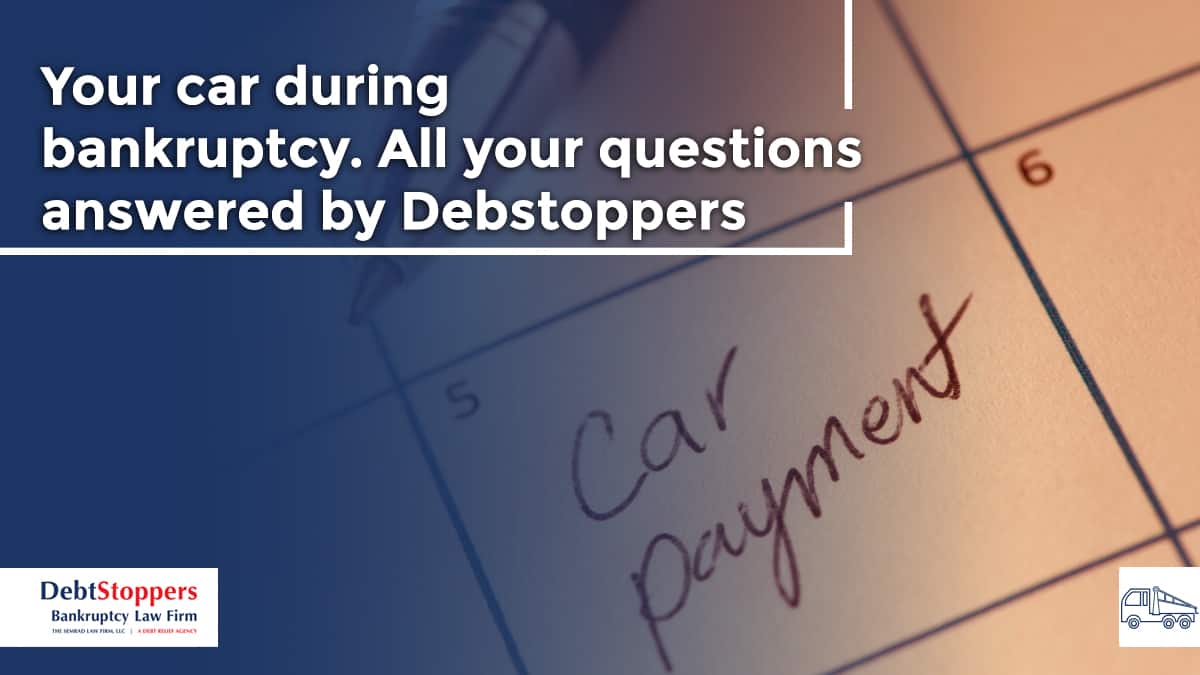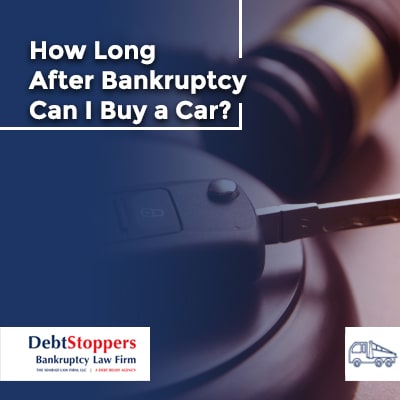Your car during bankruptcy. All your questions answered by Debstoppers

If you are behind of your car payments or have already filed for bankruptcy, you likely have several questions about what happens to your car. This blog answers your questions about what happens to your car if you file for bankruptcy.
If I File For Bankruptcy, What Happens to My Car?
When you file for bankruptcy, what happens to your car depends on several factors, including the type of bankruptcy you file (Chapter 7 vs Chapter 13), your equity in the vehicle, whether you're current on your car payments, and if you can make regular payments in the future.
What happens if I’m behind on car payments?
If you are behind on car payments, several things could happen depending on your situation and what steps you take next.
If you’re behind on payments, the lender can repossess your car. In many cases, the repossession company will take your vehicle without giving you advanced notice. It’s important to know that repossession can happen relatively quickly, depending on your loan agreement and state laws.
If your car is repossessed, the lender can sell it to recover the remaining balance on your loan. If the sale doesn't cover the full amount owed, you may be responsible for paying the difference, which is known as a deficiency balance.
To avoid repossession, you can contact your lender to negotiate a payment plan, defer payments, or restructure the loan. Some lenders may offer to modify the terms of your loan, such as extending the repayment period or reducing the monthly payment to help you get back on track.
Filing for bankruptcy will also protect your car. When you file for bankruptcy, an automatic stay goes into effect, which stops the lender from repossessing your car.
Can I File Bankruptcy and Keep My House and Car?
Yes, you can file for bankruptcy and keep your house and car. It’s important to know that filing for bankruptcy doesn’t automatically mean you will lose your house and car. With the right approach, you can often find a way to keep it, whether through exemptions, repayment plans, or negotiating with the lender.
Will I lose my car if I file Chapter 7 vs. Chapter 13 bankruptcy?
Yes, people can often keep their car if they file for bankruptcy. However, there are several factors you should consider including the type of bankruptcy you file (Chapter 7 or Chapter 13), the equity you have in the car, and whether you're current on your car payments.
In Chapter 7, you may be able to keep your car if the equity is less than the allowed exemption limit in your state. Each state has different rules about how much equity you can protect. If the equity is below the exemption limit, you can typically keep your car as long as you continue making the payments.
Alternatively, you can sign a reaffirmation agreement, which means you agree to continue paying the car loan as if you hadn’t filed for bankruptcy. This allows you to keep the car, but you are still responsible for the debt even after bankruptcy.
There is also a process called redemption that allows you to pay the lender the car’s current market value in a lump sum, even if that’s less than what you owe on the loan. This can be a good option if the car is worth significantly less than the outstanding loan balance.
On the other hand, if you are current or behind on your payments, Chapter 13 allows you to catch up on missed car payments through a structured repayment plan. You’ll have three to five years to pay your car loan, which can make it easier to keep your car if you’re behind on payments. As long as you follow the repayment plan, you can keep the car.
If you owe more than your car is worth, you may be able to cram down the amount you owe to match the car’s actual value. This is only possible if the loan is older than 910 days (about 2.5 years) when you file for bankruptcy.
Chapter 13 may also allow you to reduce the interest rate on your car loan, which can lower your monthly payments.
How does bankruptcy affect car loans?
Bankruptcy can significantly affect your car loan, and how it impacts you depends on the type of bankruptcy you file (Chapter 7 or Chapter 13), your car loan status, and whether you want to keep or surrender the car.
It’s important to know that bankruptcy rules regarding car loans can be complex, and the right choice depends on your financial situation, car loan status, and long-term goals. A bankruptcy attorney can provide guidance on whether Chapter 7 or Chapter 13 is best for you, how to handle your car loan, and what to expect during the process. \
For many people, filing for bankruptcy can offer solutions for managing car loans that range from catching up on missed payments to reducing the amount owed. An attorney can help you understand how it affects your car loan can help you make the best decision for your situation.
What are car exemptions in bankruptcy?
Car exemptions in bankruptcy refer to laws that allow you to protect a certain amount of equity in your vehicle from being sold to pay off creditors. Whether you can keep your car during bankruptcy depends largely on how much equity you have in the car and whether that equity is covered by exemptions.
Car exemptions are a key factor in determining whether you can keep your car during bankruptcy. By understanding the exemption rules in your state, you can make informed decisions about how to protect your assets and navigate the bankruptcy process.
If your equity is below the exemption limit allowed in your state (or under federal law, if applicable), you can keep the car. If your equity exceeds the exemption limit, the trustee may sell the car, pay off the loan, and use the remaining funds to pay your creditors.
Each state has its own rules on how much equity you can exempt. Some states allow you to exempt a few thousand dollars of equity, while others may have higher or lower limits. In some states, you may also be allowed to use wildcard exemptions, which let you protect any asset (including your car) up to a certain amount.
Alternatively, some states allow you to choose between using state or federal exemptions. The federal exemption system also has a limit for vehicle equity, which may be higher or lower than your state’s exemption. You can select whichever option is more favorable to you. As of 2024, the federal exemption for vehicles is $4,450, but this amount is adjusted periodically for inflation.
Since car exemptions vary greatly by state, it’s important to consult with a bankruptcy attorney who understands the specific rules in your area. They can explain your options and guide you through the process of keeping your vehicle.

How Long After Bankruptcy Can I Buy a Car?
Rebuilding your finances and credit after bankruptcy takes time, but you can still buy a car. By waiting a bit after discharge, focusing on improving your credit, and budgeting wisely, you’ll have better chances of securing a car loan with reasonable terms.
How does bankruptcy affect my credit score?
Bankruptcy has an immediate negative impact on your credit score, and the effects can last for several years. However, the specific impact depends on how you manage your credit after bankruptcy.
When you file for bankruptcy, it becomes part of your public record, and it will be listed on your credit report. This record indicates to lenders that you have filed for bankruptcy, which can make it harder to obtain credit in the future.
Chapter 7 bankruptcy remains on your credit report for 10 years from the date of filing and Chapter 13 bankruptcy stays on your credit report for seven years from the date of filing; as you make consistent payments on your Chapter 13 plan, you might probably see gradual improvement in your credit score.
How can I improve my chances of financing a car post-bankruptcy?
There are several ways to improve your chances of financing a car post-bankruptcy. It’s important to know that payment history makes up 35% of your FICO score, and missed payments leading up to your bankruptcy, along with the bankruptcy itself, can severely damage this aspect of your credit score. However, once debts are discharged, you can start building a better payment history.
Credit utilization is another major factor in your credit score and filing for bankruptcy discharges many of your debts, which can lower your utilization rate and potentially benefit your credit score if you manage new credit responsibly.
While the bankruptcy will stay on your credit report for seven to ten years, your credit score can start improving within a few months if you take steps to rebuild it. In about two years, you might see noticeable improvements, and within three to five years, you may be able to qualify for better credit offers, such as car loans or even mortgages.
Getting a Car After Bankruptcy: Where to start?
A secured credit card can be a great way to rebuild your credit after bankruptcy. You make a deposit that serves as your credit limit, and by using the card responsibly, you can start improving your credit score.
Timely payment of bills, including rent, utilities, and any remaining debts, can gradually improve your credit score. Payment history is the most important factor in your credit score, so consistent, on-time payments can make a big difference.
Some banks and credit unions offer credit-builder loans designed to help people rebuild their credit. With these loans, you make fixed monthly payments, and the funds are released to you once you’ve paid off the loan. Successfully completing the loan can help boost your credit score.
Ultimately, developing positive financial habits, such as budgeting, saving, and avoiding new debt, can help you build a solid financial foundation and improve your credit score over time.

Should I buy or lease a car after bankruptcy?
Deciding whether to buy or lease a car after bankruptcy largely depends on your financial situation, needs, and long-term goals.
When you buy a car, you own it outright after the loan is paid off. This means you’re building equity in an asset, even if the car’s value depreciates over time. Additionally, there are no mileage restrictions, you have the freedom to modify the car as you like, and ultimately there are lower long-term costs. However, after bankruptcy, buying a car might come with higher interest rates, which can make monthly payments more expensive and lenders might require a larger down payment if you’re buying a car after bankruptcy, especially if your credit score is still low.
On the other hand, leasing typically comes with lower monthly payments than buying. This might make it easier to afford a newer or nicer car than you would otherwise be able to buy after bankruptcy. Since lease terms usually last for a few years, the car is often under warranty for most or all of the lease, which means you may spend less on repairs and maintenance.
However, leasing means you’re essentially renting the car, so you don’t build equity. At the end of the lease, you don’t own the car and have to either return it or lease another one. Additionally, leasing after bankruptcy might come with higher lease rates, which makes leasing more expensive than it would be for someone with a better credit score.
Both buying and leasing have their advantages and challenges after bankruptcy. Choosing the right option depends on your financial recovery plan, driving habits, and budget.
What kind of down payment might be required?
After bankruptcy, there will likely be a much higher down payment required than for someone with a strong credit history. Typically, the down payment can range from 10 % to 20% of th car’s purchase price.





